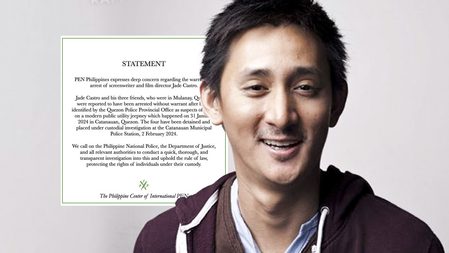SUMMARY
This is AI generated summarization, which may have errors. For context, always refer to the full article.

MANILA, Philippines – Film director Jade Castro and his friends are still detained six days after they were arrested in Quezon province for alleged arson in connection with the burning of a modern jeepney.
Theirs is a case of warrantless arrest and hot pursuit that local police insist was legal. But more details have since surfaced that cast doubt on the claim of legality.
Castro, who helmed critically acclaimed films like Endo and Zombadings, and three of his friends – Ernesto Orcine, Noel Mariano, and Dominic Ramos – were arrested without warrant on Thursday, February 1, over the burning of a jeepney.
Under the Rules of Court, a person may be arrested without a warrant if he/she is caught in the act, if there’s a probable cause to believe that a crime was committed, or if the person is a fugitive. Hot pursuit is done under the second category, or when there is probable cause. Calabarzon regional police director Police Brigadier General Paul Kenneth Lucas told Rappler that the probable cause was the identification of the driver and conductor of the burned vehicle.
The validity period, or the time limit from when the crime was committed to arrest suspects, vary per circumstance, and depends on the court’s discretion on what is “immediate” in a given context. The modern jeepney was burned in the evening of January 31; the group was visited by police in the morning of February 1, and arrested later that day.
“Well, ang basis natin doon is tama ‘yong pag-arresto ng pulis natin kasi within the prescribed period naman noong in-aresto sila. ‘Di naman kami nag-lapse doon sa oras (Well, our basis was, our arresting police personnel did not err in the arrest because it happened within the prescribed period),” Lucas told Rappler on Wednesday, February 7.
As of posting time, Castro and his companions were still in police custody. The complaint against the four was still undergoing preliminary investigation (PI) before prosecutors, so bail is not yet an option.
This is another issue because warrantless arrests undergo what is called an inquest proceeding, an expedited type of PI because they were detained without a warrant. Under the Revised Penal Code, a person arrested without a warrant should be brought to court within a maximum of 36 hours, and that is already for grave violations. It’s been more than 36 hours for Castro and friends.
DOJ spokesperson Assistant Secretary Mico Clavano said on Friday, February 9, that Castro and his friends waived their rights to undergo inquest proceedings under Article 125 of the Revised Penal Code “in order to submit a counter affidavit where the prosecutor will evaluate their defenses.”
However, Castro’s lawyers told Rappler that although Castro signed the waiver, it was not informed consent. The film director’s present counsels were not yet involved in the preliminary investigation at the time, and got only onboard in the case on February 5.
“By without ‘informed consent’ it means these tourists may not have been fully informed of the consequences or effects or they may not have fully comprehended what the waiver of Art. 125 is,” Carmela Peña, one of Castro’s counsels, said.
Human rights lawyer Chel Diokno announced in an X post (formerly Twitter) that he paid a visit to the detained film director and his friends. Diokno, now part of Castro’s legal team, also questioned the legality of the arrest.
“Sa aking pagsusuri, walang sapat na dahilan na hulihin sina Jade (Based on my observation, there’s not enough basis to arrest Jade and his companions). They were not caught in the act of committing a crime; there was no legitimate hot pursuit operation; and they did not escape from custody,” Diokno said.
Castro’s case has brought renewed criticisms on how police handle warrantless arrests and hot pursuits. Human rights lawyer Sol Taule, who often responds to cases of activists arrested without a warrant, said on X (formerly Twitter) that “the arrest of Direk Jade Castro and companions is a result of sloppy police work for the sake of apprehending someone.”
What happened
The crime was supposedly committed in Catanauan town in Quezon, less than an hour away from Mulanay town, where Castro said he and his friends were staying for a holiday trip.
Jasper Castro, Jade’s brother, told Rappler that the group spent the night at a resort in Mulanay.
“Nag-check-in sila with their real names. So ‘di ba, kung meron kang gagawin, hindi ka naman mag-check-in ng totoong pangalan (They checked-in the hotel with their real names. If you were planning to do something illegal, you would not check in using your real name),” Jasper said.
ABS-CBN’s TV Patrol reported that closed circuit television footage (CCTV) showed Castro and his friend’s car passing through a Mulanay road at around 7 pm on January 31, when the crime was committed in Catanauan. Another CCTV footage showed that at around 7:25 pm of the same night, Castro was seen filming the rehearsal of a local pageant in Mulanay town plaza.
In addition, two Mulanay town officials said they were with Castro and his friends when the alleged arson happened in the other town.
“But of course, they are entitled doon sa sinasabi nilang ando’n sila that time. Entitled sila doon, ‘no? They have to prove that in court kasi ando’n na nga sa korte ‘yong kaso kasi nga na-file na natin (But of course, they are entitled to their claim that they were on a different town at the time of the alleged crime. They are entitled to that, right? They have to prove that in court because we already filed the case),” Lucas told Rappler, in response to Castro’s defense.
Jasper said of his brother: “Buong buhay ko, kilala ko siya. Hindi siya talaga violent eh…Never siya nagkaroon ng criminal records. Wala talagang kahit ano, wala sa nature niya (All my life, I’ve known my brother. He’s not really violent. He has no criminal record. There’s nothing, it’s not in his nature).”
Blanchie Baticulon, one of Castro’s legal counsels, said they were in the process of completing her client’s counter-affidavit to the accusations.
“We, the families of Jade, Noel, Ernesto, and Dominic, demand a transparent and fair investigation. We ask all the concerned government agencies to look into this matter, assess the facts, and act accordingly and immediately. We ask the media to be more critical and fair. We ask everyone to be vigilant in following this case,” the families collectively said. – Rappler.com
Add a comment
How does this make you feel?


![[Only IN Hollywood] ‘Kinds of Kindness’ cast, Lanthimos on their ‘bizarre, special’ film](https://www.rappler.com/tachyon/2024/07/KindsofKindness-Emma-Stone-Yorgos-Lanthimos-and-Jesse-Plemons-at-the-New-York-premiere-of-Kinds-of-Kindness-Searchlight-Pictures11.jpg?resize=257%2C257&crop=238px%2C0px%2C853px%2C853px)
![[Only IN Hollywood] Producer Alemberg Ang reveals details on Isabel Sandoval’s ‘Moonglow,’ other projects](https://www.rappler.com/tachyon/2024/06/AlembergAng-Alemberg-Ang-Isabel-Sandoval-and-Arjo-Atayde-on-set-of-their-Moonglow-set-in-the-60s-and-70s.-Contributed-Photo.jpg?resize=257%2C257&crop_strategy=attention)
![[Only IN Hollywood] Kevin Costner’s big financial gamble to make not one but four ‘Horizon’ films](https://www.rappler.com/tachyon/2024/06/kevin-costner-standing-ovation.jpg?resize=257%2C257&crop=187px%2C0px%2C853px%2C853px)





![[The Slingshot] Lito Patay’s 4 hours and 38 minutes of infamy](https://www.rappler.com/tachyon/2024/07/Lito-Patay-4-hours-infamy-July-19-2024.jpg?resize=257%2C257&crop=233px%2C0px%2C720px%2C720px)
There are no comments yet. Add your comment to start the conversation.